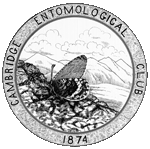
| January 2008: Psyche has a new publisher, Hindawi Publishing, and is accepting submissions |
On the Repugnatorial Secretions of Carabus vinctus.
Psyche 17:86, 1910.
Full text (searchable PDF, 72K)
Durable link: http://psyche.entclub.org/17/17-086.html
The following unprocessed text is extracted from the PDF file, and is likely to be both incomplete and full of errors. Please consult the PDF file for the complete article.
86 Psyche [June
the rare occasions, when this happens, important organs like the mandibles, antennae, labium, maxillae, palpi and eyes are kept scrupulously free from the parasitic growth. Although, as pre- viously stated, many of the L. neoniger bristled with the Laboul- benia, there were scattered over their chitinous integument numer- ous minute black dots representing the points of attachment of fungi that had been completely torn away, either by attrition against the walls of the nest galleries, or more probably, by the strigils and tongues of the ants themselves. The observations at Ellisville indicate that the parasitic fungus can luxuriate only on the members of ant-colonies which have become enfeebled or depauperate through nesting in soil which is too moist, saline or foul, or of an abnormally high temperature when exposed to the sun.
ON THE REPUGNATORIAL SECRETION OF CARABUS VINCTUS.
A rather unexpected occurrence happened at the capture of my first specimen of this species, which I had discovered under some old boards near the Shawshine River in Andover, Mass. I picked it up between the thumb and finger for a closer examination and, when perhaps a foot from my face, heard a slight snapping noise which was followed by the sensation that might be produced by the application of red hot needles to one's face. This intense burning lasted until I bathed my face in alcohol. Since then I have taken two specimens in Frarningham and, in each case, noticed the same snapping noise, but as I took good care not to get the insect very near my face, I did not experience the previous unpleasant results. The elytral edges are strongly reflexed in this beetle and at the apices a slight hollow is formed which would hold a small quantity of the fluid secreted; and when the elytra receive the pressure of the thumb and finger they snap past each other and the resultant spring throws the fluid off in a fine spray. C. A. FROST.
================================================================================
Volume 17 table of contents